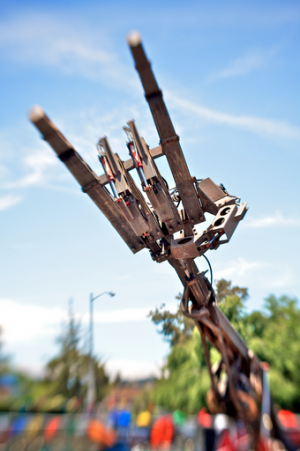
Notice the smattering of bolded numbers between 2006 and 2010?
Those two dots, called the number range operator, tell Google to look for any number between (and including) the two given. It's a sort of fill-in-the-blank, but for numbers, that here allows you to find pages referring to the first five years of Maker Faire.
In its simplest form the number range operator is helpful, but start playing with its functionality, and it becomes powerful indeed.
To get started, if you have a shopping need, you can use the number range operator with a dollar sign to look for items within a certain price range:

The challenge of a search like [soldering iron $50..$100] is that the words soldering iron will appear on the same page as the dollar figure you desire, but the two might not actually be associated with each other (it might be a price for something else). You can use double quotes to “glue” the number to a word that defines it.
For example, many young students are learning about circuitry via Squishy Circuits. AnnMarie Thomas's no-solder, no-sparks approach to developing circuits uses four 1.5V batteries (6V total) to power a series of wires, LED lights, and/or motors. If a student wanted to shop for a motor for her project, Thomas suggests a “low current draw (~30mA) ... rated for about 5 volts.”
Now, you can look for just that kind of motor, but retain some flexibility:

Number range searches are not only useful when you have a top and bottom parameter to your range. They also work as a “greater than” search by simply leaving off the second number. For example, when a project requires a battery of more than 220 volts:

One time-saving use of the number range operator is when you have a bunch of numbers for which you need information, and don’t want to do lots of different searches.
For example, imagine a student invented an implement for commuting cyclists and wanted to figure out in which San Francisco zip codes he should try marketing it. Generally the student would need to enter each zip code, separated by an OR: [means of transportation bicycle zip code 94100 OR 94101 OR 94102 OR 94103] and so on. That requires a lot of numbers. But look how the number range operator simplifies that search:

The number range operator turns out to be useful in many unusual circumstances. One favorite use is to find online discussions with healthy amounts of commentary. As many pages with blog-like formats state how many comments have been made, a greater-than search for a minimum desired number of comments can bring back interesting results:

How could you use number range searching to find what you need?


